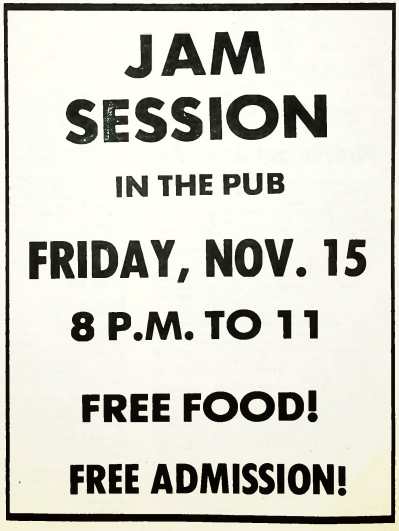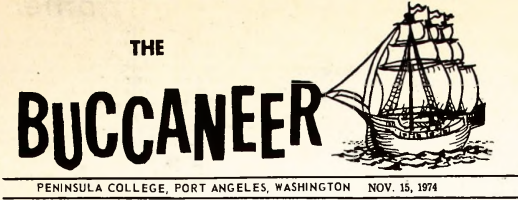
PC may not have day care center
It appears that unless the
BOC, or some outside agency,
allocates funds, Peninsula
College will not have a day care
center, at least not this year.
Students interested in a day
care center made their request
for funds at a BOCmeeting Nov.5 According to the budget they
requested, the BOC, or the
college, would allocate $2,855 to
be matched by federal funds,
and with fees from student
participants, the budget of
$18,220 could be reached.
However, the college will not
sponsor a day care center this
year. “It is not in the college
budget,” College President E.
John Maier said. According to
Mr. Maier, in order to allocate
funds from the college, a
proposal would have to have
been made the beginning of A proposal can be made
for next year’s budget after the
first of the year, Mr. Maier said.
Leona Selin and Gail Tondettar spoke on behalf of the
day care center, making an
appeal for the funds. Ms. Selin
said she came to PC from
Olympic College in Bremerton
expecting to find a day care
center, and was very
disappointed to find none.
Ms. Tondettar also said she
was displeased with the present
commercial day care
downtown. Both women said
they wanted something that
would enrich their children as
well as babysit them while the
mothers attended classes.
Steve Kimball then said, “If
you are going to enrich yourself
I don’t think you should expect
someone else to pay for your
children.” Kimball said he is
completely opposed to giving
the group any money because
they would receive matching
federal funds, the facility would
be limited to the number of
students it could serve, and
because as every student must
pay a $14.50 student body fee,
every student would be paying
for a service that only a few
could ever use.
“Your children are not my
social responsibility,” Steve
declared. “There is no way I
will vote for any of this.”
“What about my part that I
pay in and you guys allocate for
everything else that’s enriching
you socially … but doesn’t do
me any good?” Ms. Selin
retorted.
Steve said he sympathized
with her argument, and would
gladly refund her $14.50 if he
could, but the fact is that only 25
students can participate. “If
there are only 25 individuals
involved and you multiply it
times $14.50 I think it’s going to
come out substantially less than
$2,855,” he said.
The topic was then tabled for
consideration at a later
meeting. Supporters of the day
care center were charged with
doing some more homework on
the project. BOC can only
allocate funds to clubs and
organizations of the college, so
the group will have to have a
constitution before anything
else can be done.
The BOC also has some
homework to do. According to
Jim Lunt and Frank Thayer,
there is some doubt whether it
would be legal to spend BOC
funds for such a project,
because of the limited number
of students it can serve.
As of press time it was
reported that the day care
“committee” is holding off on
any more action till the first of
winter quarter.
Studium presents Eastern philosophy, Brass Ensemble
With the Christmas season
approaching, Studium Generale
will depart from its regular
format of lectures and present
instead two programs dealing
with self-improvement and
entertainment.
Mrs. Lillian Carter will be
Studium’s guest on Nov. 21 with
a presentation of Yoga and
Hindu philosophy. Since there is
a growing interest in Eastern
culture and customs, two shows
have been scheduled, one at
noon, and another at 8 p.m. in
the Little Theater. Admission to
non-members will be $1 at
noon and a donation will be
asked for the evening
performance.
Another noon-evening show
has been set up for the Seattle
Brass Ensemble, Tuesday, Nov.26.
The ensemble will present a
musical program ranging from
baroque to modern jazz.
Admission to the evening
performance will be $2 for
adults and $1 for students.
Dr. W. Ananda, Professor of
Oriental Studies, presented a
lecture on “Ceylon: Its People,
Life and Culture” on Nov. 14.
His talk was aided by a slide
show and musical
arrangements taken from
Ceylon.
Audience participation was
the highlight of Douglas
Gilleland’s demonstration on automotive emissions testing.
Everyone received a sheet noting the specifications of the test engine. As Mr. Gilleland and his assistants, Harold Walters and Mike Hansen, administered the test, the audience compared their specifications with the actual readings from the engine onstage. Luckily, the emissions checked out, and everyone breathed a little easier. The most popular lecture so far was presented Oct. 31 by Rabbi Raphael Levine. The subject was “Unity in Diversity,” but the actual discussion between Levine and the audience ranged from politics to religion, and several other subjects. Over 140 persons described his lecture as “excellent,” the highest yet. After thanking Levine for his time, emcee Werner Quast asked the audience if they would like to see Levine again. He has been scheduled to appear again sometime during spring quarter. A questionnaire will be passed out soon concerning winter and spring Studium Generale scheduling. Students will be asked what they would like to see in Studium ’75.
Food manager leaving
Food service manager Dan
Miracle is leaving Peninsula
College and Capitol Foods Nov.
20, to accept a job as head chef
at a new country club in
Wisconsin.
Mr. Miracle is leaving
because he has been offered a
job with “more pay, less
responsibility and less work,”
he said.
Mr. Miracle is an employee of
Capitol Foods, thefirm thatis in
charge of the cafeteria and
snack bar, and it is their job
now to find a replacement.
According to Mr. Miracle, a
replacement is on his way, but
all he knows is that Capitol
Foods said he is a qualified
man.
Mr. Miracle said he very
much enjoys working for
Capitol Foods and also feels the
area “is fantastic,” but the
thought of being just 15 miles
from his hometown of Neenah,
Wise., (and the higher pay), is
just too appealing.
Mr. Miracle wishes to make
one statement to the dorm
students before he leaves,
though. “I’d like them (the
dorm students) to give him
(Miracle’s replacement) the
courtesy and respect they gave
me. Give the poor guy a break,”
he says.
Foreign student here on sister’s advice
By JOAOFOLTRAN
Clarence Lai-Kai Chow from
Hong Kong has been attending
PC since 1973, majoring in
biology. He decided to come to
Port Angeles on the suggestion
of his sister, who lives in
California and had been
traveling around Washington
State.
Clarence is the next to the
youngest in a family of five,
with two brothers, one of whom
is attending college in
Pennsylvania, and two sisters.
His father runs a kindergarten
in Hong Kong and is providing
the money for his education in
the United States.
The PC dormitory was
Clarence’s home last year, but
now he isliving in an apartment
with two roommates.
He will graduate from PC at
the end of spring quarter. Then
he plans to go to University of
Washington or Ohio State
University to get a degree in
medical illustration or biology
and art, returning to Hong Kong
after that.
This quarter he is carrying 15
credits and taking courses in
micro-biology, anthropology,
painting, volleyball and golf.
Clarence experienced some
difficulties with English when
he arrived, although he had
taken several English courses
in his native country. It took a
long time for him to get used to
the American food, because in
Hong Kong he used to eat rice
every day. He found Americans
quite friendly and always ready
to help. “I had no difficulties
getting along with them.” he
said.
Clarence enjoys bowling, bike
riding, and swimming, which he
doesn’t do much around here
because the water istoo cold for
him. The weather here is much
colder than in his country,
where the snow never falls and
the rain falls in the summer.
Last summer he stayed with
his sister in California, where
he spends most of his holidays.
Next summer he may be going
to Hong Kong to see the rest of
his family.
He has no religion, but his
parents believe in Buddhism.
Clarence misses the Chinese
movies. And about music, he
said: “We get a lot of American
music and we dance exactly the
same way.”
He likes most the wooden
houses here, because they are
not very common in Hong Kong.
“I like Port Angeles very
much,” he says. “It is a
beautiful and peaceful place. In
a way it reminds me of Hong
Kong because of the waterfront
and because of the mountains. I
love nature.”
Halloween dance held
Itwas a rainy Friday with the
moon hiding behind the clouds;
just a perfect night for the PC
Halloween danc^ which was
held last week in the PUB.
Best costumes prizes went to
Charles Sampson as “Dracula”
and Sidra Johansen as “Belly
Dancing.”
Among phantoms, clowns,
Draculas, children’s stories
characters, and happy pussy
cats (because no dogs showed
up), the group “Rush”
entertained those who came to
have an outstanding time.
Mr. Lunt was seen walking
around, with his camera
alongside him, trying to get
happy moments for the
posterity.
Editorial
Day care center- Not BOC responsibility
The question of a Day Care Center was brought to
the BOC by a group of concerned students, and the
proposal, plus an appeal for $2,855, is being
considered. The idea is a good one in concept, and not
many will doubt the need for such a service. However,
the BOC should not fund the project.
According to the group’s proposal, $3.57 would be
spent per full time student (based on an enrollment of
800) or approximately $1.19 per student per quarter, if
the BOC allocated the funds.
With the money requested, however, only 25 to 30
students could use the services of the center. The
question of allocation is a question of legality as well
as ethics. Should the BOC give $3.57 of each student’s
money so that 25 students can have their children
enriched? Or, is it legal for BOC to give $2,855 to an
organization that only serves a small percentage of
the college?
The BOC should not give any money to any project
unless it is available to every student, or unless it has
the majority support of the student body. A dance is
open to all students, and every student can turn out for
school athletics, or be involved by being spectators.
The entire school can’t be on the team, but they can
still apply.
In order to apply for day care, however, the student
must have a child, and this qualification limits the
project to just parents or guardians.
Day care is an important need, but not for every
student. And this is what the BOC must look out for.
The college, on the other hand, should support the
proposal. President E. John Maier says that the
project isn’t in the budget, but it seems that something
could be done, if only just to look into the need for such
a service. A quality day care service could increase
enrollment, satisfy some students, and give the
community another service, which in turn would
encourage them to support the college further.
A word to the Board of Trustees: Don’t let the
project stop. The key to a day care center is in the
hands of the college, and it is their responsibility to see
it doesn’t get lost in the shuffle.
— Jeff Bialik
Briefs from other campuses
Enrollment at Everett
Community College is down
from comparable figures a year
ago. The total enrollment this
fall is 5,860 according to the
initial enrollment figures, down
1,600 from Spring quarter. The
number of full-time students,
3,625, is down 175 to 200 from a
comparable period last fall.
Fairhaven College, a cluster
college of Western Washington
State College, has reached an
enrollment of 521, the highest in
its seven-year history.
Education at Fairhaven is
focused mainly on self-directed
and life-related learning.
Students have an opportunity to
design a major to fit their own
academic needs. Also, the
learning process of Fairhaven
students isn’t based on the
traditional grading system.
Instead, many classes have
been replaced by a “projectorientated approach.”
Almost 90 per cent of the
women questioned in a recent
survey at WWSC said they
would like to see some kind of
male escort system provided
for their safety.
Another 80 per cent said they
hesitate to walk alone on the
campus after dark.
The men questioned on the
survey said they would agree to
the escort program if it would
make the women students feel
safer.
Many of the women students
say they are already taking
precautions while walking alone
on campus. One said she
carried tear gas, another said
she is learning judo, and
another carries a knife.
Enrollment figures at
Western Washington State
College have passed all
estimates made by the school.
WWSC has reached the 8800
level, exceeding last fall
quarter’s enrollment by at least
700 students.
The administration had hoped
for about 7,700, but with the
rising number of transfers and
the regular amount of freshmen
the totals have risen sharply.
The Wall Walla Community
College newspaper, Fourth
Estate, is highly unusual, and
worthy of a little background
information.
Long ago, when Britain
established a democratic
government, it recognized three
estates or classes that carried
the responsibility of finding and
spreading the truth. These
classes were the nobles,
because of their knowledge; the
church, because of its high
morals; and the common
people, because they were the
backbone of the country and
had an obligation to know.
The British government
acknowledged the press as an
institution serving the people in
the early 1800s and gave it the
unofficial title of fourth estate.
At WWCC the Fourth Estate
goes on, searching for the truth
in all endeavors.
In six years, Shoreline
Community College has
experienced a dramatic change
in the makeup of its student
body.
In 1968 the majority of the
students at SCC were males
with an average age of about 21,
compared to the 51 per cent
female enrollment in 1974 and
an average age of 27.
Sasquatch is alive and well in
the Pacific Northwest
according to Grover Krantz,
associate professor of
anthropology at Washington
State University.
As recently as Oct. 7,
Sasquatch prints were found
near Vancouver, Wash., by a
group of loggers and Krantz
was informed soon after. The
loggers had found 161 prints 18
inches long and 7 inches wide,
with an average stride of about
four feet. The creature is
estimated to be eight feet tall
and weigh about 800 pounds.
“I’ve seen some pretty
sophisticated fakes,” said
Krantz. “It is overwhelmingly
probable that these are real.”
Krantz has been a believer in
Sasquatch, a Salish Indian
term, since 1970, and has
actively studied it ever since.
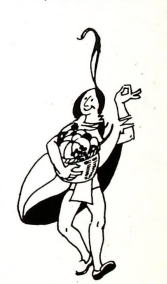
Library Corner
The library is continually
adding new books to its
collection. An example of these
additions follows:
“Deeper into movies” is
Pauline Keal’s latest, biggest,
best and most unified collection
of critical essays about the
movies. Ms. Keal is considered
by many readers and reviewers
as “a great critic,” “the best
movie critic now writing in the
United States,” “a national
treasure.” “Deeper Into
Movies” brings together 72
memorable and provocative
chapters, focused on more than
150 American and foreign
movies in release since the end
of the 1960’s.
“Uncoupling; The Art of
Coming Apart,” by Norman
Sheresky and Marya Mannes.
Because divorce spells failure
both to the participants and to
the society around them,
Sheresky and Mannes observe
that “the disintegration of a
marriage is almost universally
ignored until it is too late . . . Most people do not want to face
what faces them.”
Mr. Sheresky, a well-known
New York attorney, much of
whose practice is devoted to
family law, and Miss Mannes, a
distinguidied writer noted for
the humanity of her views —
have found that “the propensity
of divorcing couples for placing
blame upon each other is idle,
unconstructive, incredibly
costly, and almost wholly
irrelevant.”
“Uncoupling” waswritten not
only for couples who want to
divorce well, but also for
couples who want to marry
well.
“How to read Shakespeare,”
by Maurice Charney. Here is a
lively, commonsensical and
contemporary companion to
Shakespeare for the general
reader. People reading the
plays for the first time will find
it particularly valuable, for
with Mr. Charney’s guidance
they will discover how to read
them creatively, without the
usual academic barriers that
have stood in the way of our
direct understanding of
Shakespeare.
Mr. Charney suggests that we
not think of Shakespeare as a
classic but as a playwright
ajmpletely vital and up-to-date
in his approach to human
experience, as free and varied
in his approach to art as
Picasso.
Letters to the editor
Radicalism reviewed
Editor, the Buccaneer:
Thomas Paine was a radical.
Why? Because he wanted to
make “extreme changes in
existing institutions.” (See
“What is Radicalism?” by
Steven Kimball in The
Buccaneer for Nov. 1, 1974).
More specifically, he
advocated a government run by
the people rather than by a
king. This struck at the very
root (Latin-radix “root”) of
monarchy, which was the
“existing institution” of that
day.
He even went so far as to
question the “existing view”
that kings ruled by divine right.
He and his supporters (Patrick
Henry, Thomas Jefferson, the
Adamses, et al) resolved to do
something around it. Thus the
United States, with its
Declaration of Independence,
The Constitution and the Bill of
Rights came into existence.
We are still working to
implement the resulting radical
ideas and I have not heard any
serious advocacy, of late, to
return to “already tried policies
and programs” of that day.
More freedom is one thing
they wanted. (They called it
liberty then, meaning freedom
from the King’s rule.) They
were not so extreme, however,
as to advocate freedom per se.
They realized that maximum
freedom is attainable only
through law protecting people
from oppressors, individual and
organized. (See Bill of Rights)
We’vemademuch progress in
this regard. (Slavery was
abolished and the franchise has
been extended.) but the world
changes. It becomes more
crowded, new technologies are
developed and resource and
space limitations become more
pronounced. These changes
demand a re-examination of
“already tried policies and
programs.” Can they meet the
new challenges or must we
create new methodology?
Let us go back to our original
goals, re-examine them and
decide whether or not we are
effectively implementing what
we need and want to do.
This is radical talk so I am
proud to be a radical because it
could make the difference
between annihilation or man’s
continued existence as a species
on this earth.
PaulMeinke
Editor, The Strait Radical
Port Angeles, Wash.
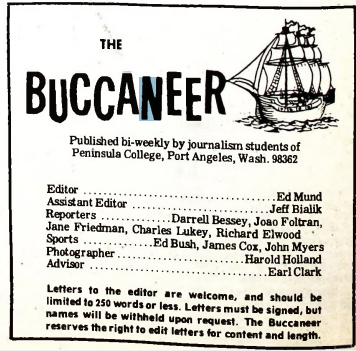
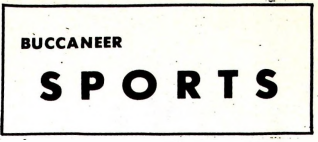
Basketball fast approaching
In a week, basketball season
will begin with Peninsula
traveling to Mount Vernon to
play in a Thanksgiving
Tournament.
Besides Peninsula, there will
be teamsfrom Trinity Western,
South Western Oregon, and the
host team, Skagit Valley.
Coach Don Huston is looking
forward to this season, in hopes
of getting a state tournament
berth, as he says “this team is
the best he has ever coached at
Peninsula.”
The team has had many
weeks of conditioning and
preparation for game type
situations.
“We are going a lot faster and
covering more ground this
year,” says Huston. “We can go
faster this year, because many
of the players are returning
lettermen of last year and
already know the offense,” he
added.
Peninsula is involved in three
tournaments this year,
including one on Dec. 29 and 30
at Peninsula. These
tournaments will allow
Peninsula to test its offensive
and defensive skills against
many teams before league
games start.
Basketball Schedule 1974-75
Date Opponent Game Site
Nov. 22-23 Mt. Vernon

Intramural sports in full swing
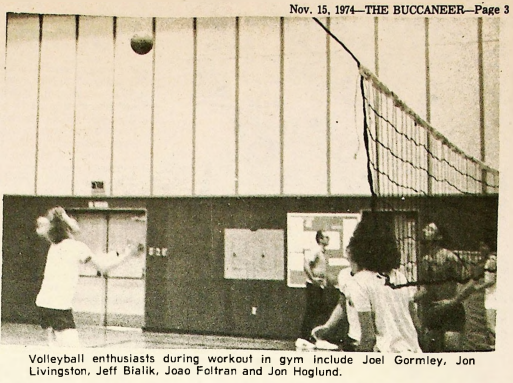
Friday, Nov. 8, brought the
end of the first round of
intramural volleyball to a close
with the Beautiful People
starting a perfect 5-0 first
round. If the Beautiful People
continue their present success
in the second round and capture
first place, it will be their third
Intramural Volleyball
Championship in a row.
Present Volleyball standings
are as follows:

The Turkey Trot will be held
Tuesday, Nov. 26. Contestants
will run one lap around the field
behind the gymnasium, run
behind the dorm, go behind the
science buildings, and will head
south out on the jogging trail.
On the jogging trail runners
will head to the power lines to
Porter Street, past the power
sub station, will take a right on
Park Avenue, and will head
back to the finish line at the
gymnasium.
The course is approximately
two miles long, and the first
team to have four runners to
cross the finish line will be the
winner. Teams are allowed no
less than four members and no
more than six.
Intramural basketball games
will get under way Nov. 18, and
a record breaking number of
teams (12) have entered this
year. If the schedule goes as
planned, each team will play 22
games.
A new rule in effect this year
will involve foul shots. This
year, no foul shots will be
attempted, except two shots
after the fifth team foul. This
rule is expected to quicken the
tempo of the game
considerably.
One more bit of news: The
areawide Elks National Hoop
Shoot Contest will be held at
Peninsula College Saturday,
Jan. 4 with teams entering from
Clallam Bay, Neah Bay,
Sequim and Port Angeles. The
age limit is 8 to 13.
Pirates get new ship
By ED BUSH
One disturbing portion of the sports program which has
aggravated many athletes has been the method of travel
from one city to another.
In years past, sports clubs were stuffed into a van with a
sitting capacity of 15 people. When you try to seat 12 tall
basketball players, two managers, and a big-headed coach,
the van gets a little crowded.
This problem has been put to an end, thanks to the
purchase of a 1965 45-seater bus. It is a five speed, diesel
powered transporter, that getsfive miles to a gallon.
Formerly, it was used by Olympic College for sports
activities, but due to insufficient funds, Olympic was forced
to surrender it to the open market. Peninsula having been
looking for a different means of traveling for a lengthy time,
made an offer of $7,500, which Olympic accepted.
As it is now, the bus is in desperate need of painting. Since
it is almost ten years old, the years of use have taken their
toll. It has numerous chips on the outside, a broken window
and an occasional rip in the upholstery. The school plans to
paint it and fix the inside in time. Whether or not it will be
done before the basketball season, which starts Nov. 22,
remains to be seen.
The bus was specially built for riding comfort of its
passengers. It comes equipped with high^backed seats, and a
seven speaker, front-to-back sound system.
To get maximum use from the bus, Mr. Feiro is focusing
his efforts to get the girls and boys basketball teams to play
at the same location, and on the same night. That way, the
girls could play a preliminary game before the boys, saving
an unnecessary trip.
Not only sports affiliated programs but other student
groupssuch as music will be permitted to use the bus.
Mr. Feiro expresses much enthusiasm about the bus,
because now it will allow those better-than-average sized
basketball playersto stretch their legs before the game, and
eliminate possible reason or excuses for losing.
Soccer team gets full funding
A soccer team is the newest
organized sport on campus.
The team was originally
organized last year, but only
had one game because of a
shortage of funds. And players
had to pay their own way to that
game.
However, this year the team
was funded with $700, but this
was still not sufficient, as it
costs $1,000 to join the league
and be able to compete in the
tournament in the spring. The
teamis playing this yearto gain
recognition from other teams in
the league.
The only game played last
year was lost to Western
Washington State College in
Bellingham.
The soccer team has played
two games so far this year. PC
lost the first game here on Oct.
26, against Seattle Central, 3-6.
The second was an away
game against Olympic College
in Bremerton, which PC won, 5-
2, bringing the Pirate soccer
team’s standing to one win-one
loss.
Next Saturday the team will
play Olympic College, and on
Nov. 27 will travel to Seattle to
play SeattleCentral. After these
two games, the team would like
to travel to Canada for some
games, but they don’t know
when they will be going.
The coach and captain of the
P.C. soccer team is a foreign
student, Abdulhakim AlHaidar. Ma’aboud
Ghozamforpour and
Abdulhakim Al-Haidar
organized the team last year
and played this year too.
There are 15 players in all,
with seven foreign students and
right American students on the
team. Squad members
Abdulhakim Al-Haidar, Saad
Al-Haidar,T Ma’aboud
Ghozamforpaur, Khalid AlDossary, Chris Kihika, David
Best, Eric Anderson, Bruce
Edwards, Steve Johnson, Rick
Basset, Ralph Alec, Bob
Krutenat, Jeff Caven and Riley
Aleck.
The team will continue next
year, and anyone is welcome to
turn out.
Girls lose 2
Peninsula College’s girls
volleyball team took a
commanding lead in the first of
two games with the team from
Everett Community College.
However PC lost their early
lead, and also lost the match, 15-
13.
The second game of the
match was close all the way, but
the high spirited Everett team
slowly overpowered
Peninsula’s disabled defensive
attempts with good team work
and all out playing, winning 15
to 11.
The two teams played a third
game for practice with the lead
changing hands all through the
game, but Everett won that one
too, 15 to 12.
Bowling club starts early
Students interested in bowling
held a meeting of the Bowling
Club Nov. 12 at 7 p.m. on
campus.
Bowling Club, under the
supervision of Dr. John Evans,
has been in operation for about
five years and has made
appearances at the Bellevue
tournament, winning two of
them. This can be attributed to
the high enthusiasm and time
put into the program by Dr.
Evans and, of course, the
students involved.
To prevent another late start
like last year, a large turnout at
the meeting would help
considerably and the Club could
get an early start this year on
the way to another successful
campaign.
Student volunteers in city
A new volunteer program is in
full swing now. The program
consists mostly of spending
some time each week to help
young people in the community.
Nine students from Peninsula
College are working with the
staff at the Clallam and
Jefferson Counties Juvenile
Courts and the staff of the Bay
View Boys and Girls homes in
this program.
Larry McFadden, Larry
Reeves, John Myers and Jaime
Pinkham are the four men
volunteers from PC and the five
women are GayAnn Williams,
Annette Wanderwall, Veda
Brown, Cleo Hill and Debora
Ethredge.
“The three week old
volunteer program has been
working very well,” says Bobbi
Overton, volunteer coordinator
at the Clallam and Jefferson
Counties Juvenile Court.
Volunteers get three credits
for participating in this
program. They are also
required to keep a log of the
activities participated in. At the
end of the 90 hours required
time spent in the program to
achieve the credits, the
volunteer hasto write up a short
report of the program. More
complete information can be
acquired from Mr. Spicer.
Volunteers can also
participate in the program
without getting credits. In this
case, it is not necessary to keep
a log or write the term paper.
The time spent each week by
volunteers is two hours an
evening for two evenings a
week. Volunteers also work two
hours each weekend, in the
afternoon.
The program is open to more
and anyone who wishes to
donate time may call or write
Juvenile Program, P.O. Box
329, Port Angeles. The
telephone number is 452-2373.
For example, referees are
needed for the 1974-75 industrial
basketball league. The pay for
this is $4 per game. For further
information, call Berdit
Greenly at 452-9840.
BOC approves appointments
The activities council is
headed by Jeff Pope, and
includes Craig Roberts, Jerome
Eberharter, Shelly Bauer and
Anet Davis. This committee
oversees all student activities.
The intramural board deals
with any problems dealing with
intramural sports. Students on
that committee are John Fors,
Dave Haguewood and Darcy Caso.
Students on the disciplinary
committee are Tim Fryer,
Kathy Feakes and Steve Norris.
This committee decides on
matters of discipline involving
students.
The community services
committee consists of Jeff
Pope, Jerome Eberharter,
Steve Kimball, Brian Murphy
and Robin Bramlette.
The BOC unanimously
approved the appointments of
President Tim Fryer at the
meeting held Nov. 5.
The appointments were to the
disciplinary committee,
community services council,
activities council, and the
intramural board. The public
relations coordinator is yet to be
named.
A look at the artists
A search for self

By JEFF BIALIK
Eight years ago in the
summer of ’66, on a $15 guitar,
Jerry Roberts learned to play.
He learned hisfirst three chords
from his father, and the rest
just came like a flood. Today
Jerry plays one of the meanest
guitars on the Peninsula,
arranges and composes music,
plays keyboards, percussion, a
little brass and woodwinds, and
does ‘ a not-too-shabby
vocalizing job. At the age of 20,
though, Jerry Stephen Roberts
is quitting rock ’n roll.
Coming from a family with a
strong country-western
background, Jerry found no
problems fitting in behind a
guitar. Cousin Pat Roberts is a
famous country-western star,
and Unde Jack Roberts books
country-western entertainment
out of Seattle. It was only
natural thatJerry would start a
group of his own.
“It was about ’67. The first
group that ever did anything
wasthe Uprights. We only knew
about three songs,” he says.
The Uprights had two or three
performances and Jerry has
been in about 27 bands since
then.
Jerry learned different styles
atfirst by playing with different
people with different
backgrounds, then later by
listening to other guitarists off
records.
While Jerry was in Stevens
Junior High he began
formulating his writing skill.
“What I used to do in junior
high, I’d sit in study hall and
write out little melodies,” he
says. Those melodies he’d take
to Mrs. Thelma McCoy for
corrections. Later in high
school, Ed Grier continued the
assistance. “I got, I’d say,
about three-fourths of my style
from Ed Grier,” says Jerry.
In 1971 Jerry started an eightpiece horn group called
Solidarity. He then started to
arrange music. Jerry would
listen to the record, write the
music on paper, then listen to
his horn players play it. If it
came out right he was all set, if
it didn’t, he learned how to fix it.
From Solidarity he went to a
four-man group, Valhallah.
Solidarity was primarily a hornarranged group, but in
Valhallah Jerry found himself
with three vocalists that could
blend. From Valhallah came
Metro, which was a
combination of vocal and horn
arrangements, and in my
opinion, Jerry’s finest group.
About the end of May when
Metro was breaking up, Jerry
was also changing. It was
during that time that Jerry
found what he feels now to be
true Christianity.
Jerry began working with the
Bill Rowland Band playing
weekends at the Elks Club, but
he was trying to find himself at
the same time. It was at that
time that he decided to quit.
“I’m not quitting music, I’m
just quitting the entertainment
field. I’m quitting any kind of
secular entertainment,
anything that doesn’t praise
God,” he says.
Jerry has decided to try to
form a youth choir at the
Independent Bible Church, and
feels it impossible to serve God
and man at the same time.
As for the future, Jerry
doesn’t see it. “I’ve quit trying
to play too much.” He’d rather
just take one day at a time.
In my own experience with
Jerry I have seen him go
through many stages, but I
think he’sfinally found his inner
peace. I can be saddened,
though, for he is a good
musician who never reached
full potential as a performer. I
can only feel gladness,
however, that he has found
himself.
